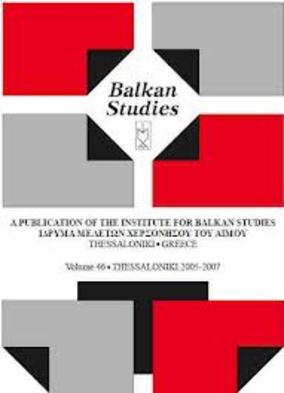The first Romanian neohellenist : Constantin Erbiceanu (1838-1913)
Part of : Balkan studies : biannual publication of the Institute for Balkan Studies ; Vol.41, No.1-2, 2000, pages 113-137
Issue:
Pages:
113-137
Section Title:
Articles
Author:
Abstract:
Constantin Erbiceanu, a pioneer in the field of Neogreek studies (especiallyon the field of Greek influences in the Romanian culture), accepted withoutuproars in the historians and the theologians conclave as a reliable specialist,enjoyed fame and great authority in the final decades of the 19th century but,after his disappearance was soon forgotten; the present study, conjoining thehistoriographic and prosopographic perspectives, aims at redeeming an inequityof the Romanian historiography, the damnation to a century of oblivionand disregard.Born on the 5th of August 1838 in the Erbiceni village of Moldavia, heremained motherless at the age of 10. After graduated the “Socola” TheologicalSeminary in 1858, he enrolled for the preuniversitary courses of thefuture “National Highschool” from Iassy, and, in 1860, he decides to attend theFaculty of Theology at the University of Iassy. Being a remarkable student,conscientious, sobre and diligent, he proposed in 1865 for a scholarship in Athens, where he learned well Ancient and Modern Greek up to 1868.Returned home, he become a professor and married in 1873 Aglaea Negrescu,related to the rich Zappas. The next ten years were peaceful and hisgreatest concern was to support his family, getting ever larger (2 girls and 3boys).The chance to assert himself came pretty late, in 1882, when the metropolitanbishop asked him to publish a clerical magazine, financially supported bythe Church. Erbiceanu was the man-of-all-trades of the new magazine and hiscareer and life gets for a constant ascent. In 1885, at an anniversary festivityhis lecture made a strong impact on the audience and the Minister of PublicEducation (D. A. Sturdza) invited him to Bucharest, to teach at the CentralTheological Seminary. The neohellenist accepted and he was appointed in1887 professor at the Central Seminary, Manager of the Church PrintingHouse, editor at the “Biserica Ortodoxä Romàna” magazine and substituteteacher at the Faculty of Theology.His work as a Neohellenist brings him a great authority in the fields ofhistory and philology and Greek erudite societies close him as a member in1886 and 1889. He was awarded numerous medals and badges that tell theirown story about his claiming, yet his supreme recognition, the designation foran academic chair, came in the spring of 1899, at the age of 61. Nonetheless,his activity gradually slows down, because of his sickness and great age.He began to write late (but this is common to almost all his succesors inthe field) and he spent his life especially publishing and translating somehistorical and literary sources, publishing studies on ecclesiastic history ordealing with the Greek cultural influences. In order to draw up his work,Erbiceanu appealed to his knowledge of Ancient and Medieval Greek history,always seeking to be well informed. He was analysing carefully the manuscriptsand the documents, “his loyal friends”, as V. Pârvan wrote, and he frequentlyvisit the monasteries throughout the country hoping to find newsources of information about the past.For his opinions regarding the Greek influence and the Phanariot century,Erbiceanu was acussed by enemies to be “the Greeks’ man”, to play the gameof the Greek propaganda, but the evolution of his career, the audience and theprestige that he came to enjoy contravene with those suppositions.Having to fight against the prejudices of his time according to which thecultural creations within Romanian borders were not written in the nationallanguage and, moreover, they originated in the Phanariot epoch or in theentire epoch of the Greek influence and were not interesting for the study ofthe Romanian culture, Erbiceanu tried, fighting sometimes the windmills, to alter his contemporaries’ beliefs and mentality and his on-goings were mostly successeful.
Subject:
Subject (LC):
Keywords:
Constantin Erbiceanu (1838-1913)




